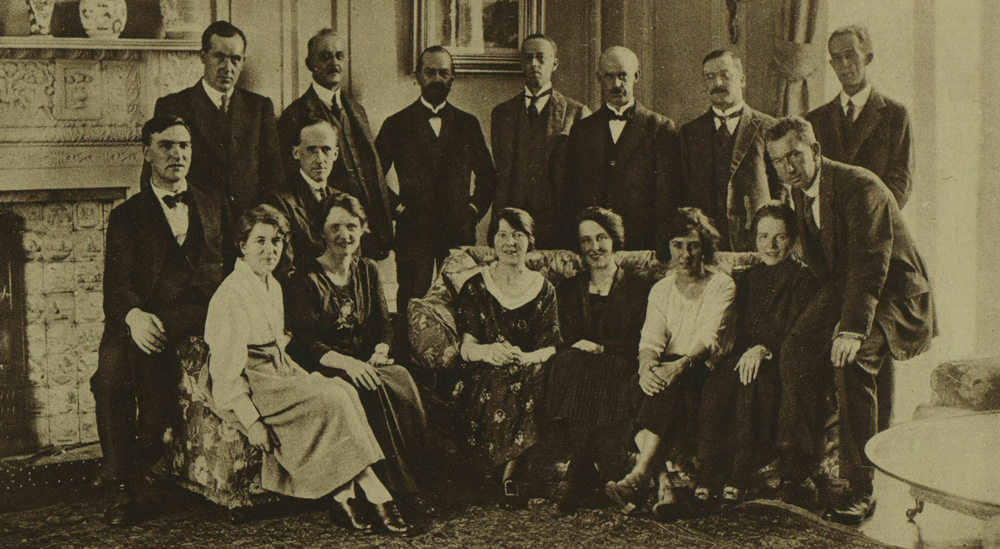Historic Anglo-Irish peace conference begins at Downing Street
London, 12 October 1921 – A historic conference to determine the constitutional future of Ireland and its relationship with the United Kingdom began yesterday in London.
At 11am the first session commenced at No. 10 Downing Street, the Irish delegation being welcomed on arrival at Whitehall by thousands of Irish sympathisers who sang Irish songs, hymns and recited the rosary.
Representing the British at the conference were the Prime Minister, David Lloyd George; the Lord Chancellor, F.E. Smith; Winston Churchill; Laming Worthington-Evans; Hamar Greenwood; and Gordon Hewart. While the Irish were represented by their plenipotentiaries Arthur Grifith; Michael Collins; Robert Barton; Éamon Duggan; and George Gavan Duffy. Absent for the British team was Austen Chamberlain who was unwell.
Also in attendance were Thomas Jones and Lionel Curtis, the British secretaries and their Irish counterparts, Erskine Childers and John Chartres.
On entering No. 10, it is understood that the Irish delegation and their secretarial staff were shown into a reception room before being taken to the cabinet room where Art O’Brien, Dáil Éireann’s representative in London, introduced them all individually to the waiting British Prime Minister who shook hands with each of them. Mr O’Brien then withdrew and the Irish delegates were directed to the chair each was to occupy for the conference, where they stood opposite their British counterparts.
Before taking his own seat, Mr Lloyd George announced the names of the Irish and British parties present, who each bowed and sat down. The British Prime Minister sat directly opposite Mr Griffith.

Left and right: Two of the residences occupied by the Irish delegates in London. Centre: Three of the typists for the Irish delegation: Ellie Lyons, Alice Lyons and Kathleen McKenna. (Image: Illustrated London News, 15 October 1921)
The delegates journey to London
The Irish delegation – aside from Michael Collins, who,
owing to family reasons, travelled later – departed by train
from Westland Row to Dún Laoghaire and from there on to
Holyhead on 8 October. Questioned by reporters before leaving if
he had anything to say to the people of Ireland, Arthur Griffith
said: ‘I have nothing to say.’
Alongside Mr Griffith were his fellow plenipotentiaries and secretaries and a larger group that included Desmond Fitzgerald, Minister of Publicity; Fionán Lynch; four typists – Kathleen McKenna, Alice and Ellie Lyons and Lily O’Brennan; as well as a porter and a messenger. May Duggan and Bridget Lynch travelled with their husbands and Piaras Béaslaí travelled with the delegation as far as Chester, where he is to attend a meeting of the Gaelic League.
A train carriage was specially reserved for the Irish delegation for their journey from Holyhead to Euston. They were welcomed at Euston Station in London by an extraordinary crowd of well-wishers, estimated at around 10,000, and over a dozen bands.

|

|
Left: Crowds of supporters surrounding the cars of the Irish delegates as they left Euston Station in London. Right: A crowd of Sinn Féin supporters accompanied by a pipe band in London. (Images: Illustrated London News, 15 October 1921)
Expectations
A mood of cautious optimism surrounds the start of the Anglo-Irish
Conference. Welcoming its commencement at its own annual meeting
in Maynooth, representatives of the Irish Catholic hierarchy says
that a ‘golden opportunity now exists of establishing that
blessed and long wished for concord by a great act of national
freedom untrammelled by limitations, and free from the hateful
spirit of partition, which could never be anything but a perennial
source of discord and fratricidal strife.’
Editorialising yesterday, the Irish Times stated that it would refuse to be pessimistic about the prospects of the conference, but could not be optimistic either. ‘We take, therefore, the middle course of hoping that the wisdom and patriotism of both sets of delegates may rise to the full height of this great occasion...’
President of Dáil Éireann, Éamon de Valera, conspicuous by his absence from the Irish delegation, has appealed for national solidarity.
In a statement issued by the Dáil’s Publicity Department, Mr de Valera says: ‘Our delegates are keenly conscious of their responsibilities. They must be made feel that a united nation has confidence in them and will support them unflinchingly.’
[Editor's note: This is an article from Century Ireland, a fortnightly online newspaper, written from the perspective of a journalist 100 years ago, based on news reports of the time.]





















